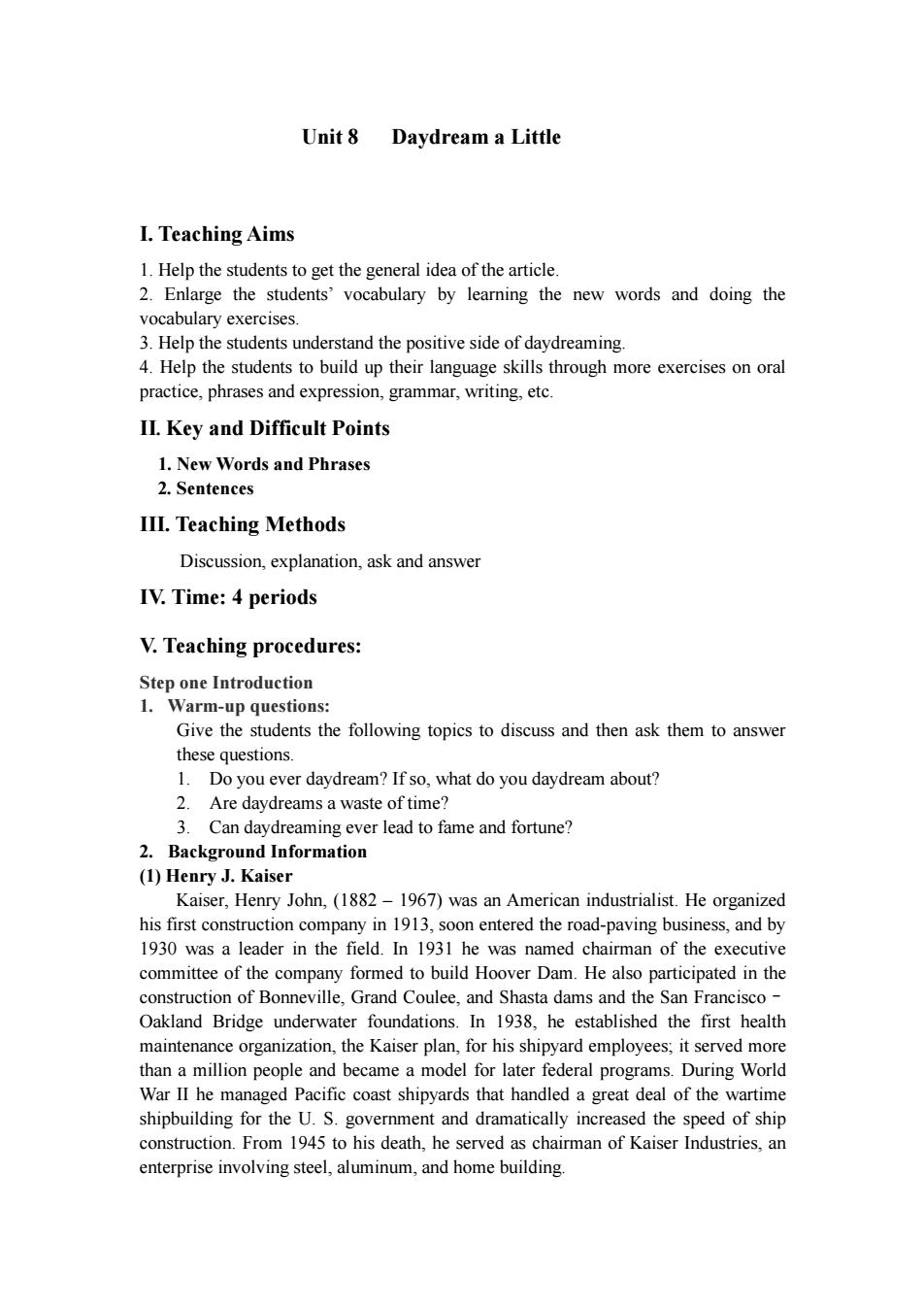
Unit 8 Davdream a Little I.Teaching Aims 1.Help the students to get the general idea of the article. 2.Enlarge the students abulary by learning the new words and doing the vocabulary exercises 3.Help the students understand the positive side of daydreaming. 4.Help the students to build up their language skills through more exercises on oral practice,phrases and expression,grammar,writing.etc. II.Key and Difficult Points 1.New Words and Phrases 2.Sentences III.Teaching Methods Discussion,explanation,ask and answer IV.Time:4 periods V.Teaching procedures: Rp stions Give the students the following topics to discuss and then ask them to answer these questions. 1.Do you ever daydream?If so,what do you daydream about? 2.Are daydreams a waste of time? 3.Can daydre aming ever lead to fame and fortune? 2.Background Information (1)Henry J.Kaiser Kaiser,Henry John,(1882-1967)was an American industrialist.He organized his first construction company in 1913,soon entered the road-paving business,and by 1930 was a leader in the field.In 1931 he a med cha an of the committe of the company formed to build Hoover Dam.He als participated in th construction of Bonneville,Grand Coulee,and Shasta dams and the San Francisco- Oakland Bridge underwater foundations.In 1938,he established the first health maintenance organization,the Kaiser plan,for his shipyard employees:it served more than a million pec ople and became a mo del for later War II he managed Pacific coast shipyards that har federal progra ms.During World shipbuilding for the U.S.government and dramatically increased the speed of ship construction.From 1945 to his death,he served as chairman of Kaiser Industries,an enterprise involving steel.aluminum,and home building
Unit 8 Daydream a Little I. Teaching Aims 1. Help the students to get the general idea of the article. 2. Enlarge the students’ vocabulary by learning the new words and doing the vocabulary exercises. 3. Help the students understand the positive side of daydreaming. 4. Help the students to build up their language skills through more exercises on oral practice, phrases and expression, grammar, writing, etc. II. Key and Difficult Points 1. New Words and Phrases 2. Sentences III. Teaching Methods Discussion, explanation, ask and answer IV. Time: 4 periods V. Teaching procedures: Step one Introduction 1. Warm-up questions: Give the students the following topics to discuss and then ask them to answer these questions. 1. Do you ever daydream? If so, what do you daydream about? 2. Are daydreams a waste of time? 3. Can daydreaming ever lead to fame and fortune? 2. Background Information (1) Henry J. Kaiser Kaiser, Henry John, (1882 – 1967) was an American industrialist. He organized his first construction company in 1913, soon entered the road-paving business, and by 1930 was a leader in the field. In 1931 he was named chairman of the executive committee of the company formed to build Hoover Dam. He also participated in the construction of Bonneville, Grand Coulee, and Shasta dams and the San Francisco– Oakland Bridge underwater foundations. In 1938, he established the first health maintenance organization, the Kaiser plan, for his shipyard employees; it served more than a million people and became a model for later federal programs. During World War II he managed Pacific coast shipyards that handled a great deal of the wartime shipbuilding for the U. S. government and dramatically increased the speed of ship construction. From 1945 to his death, he served as chairman of Kaiser Industries, an enterprise involving steel, aluminum, and home building
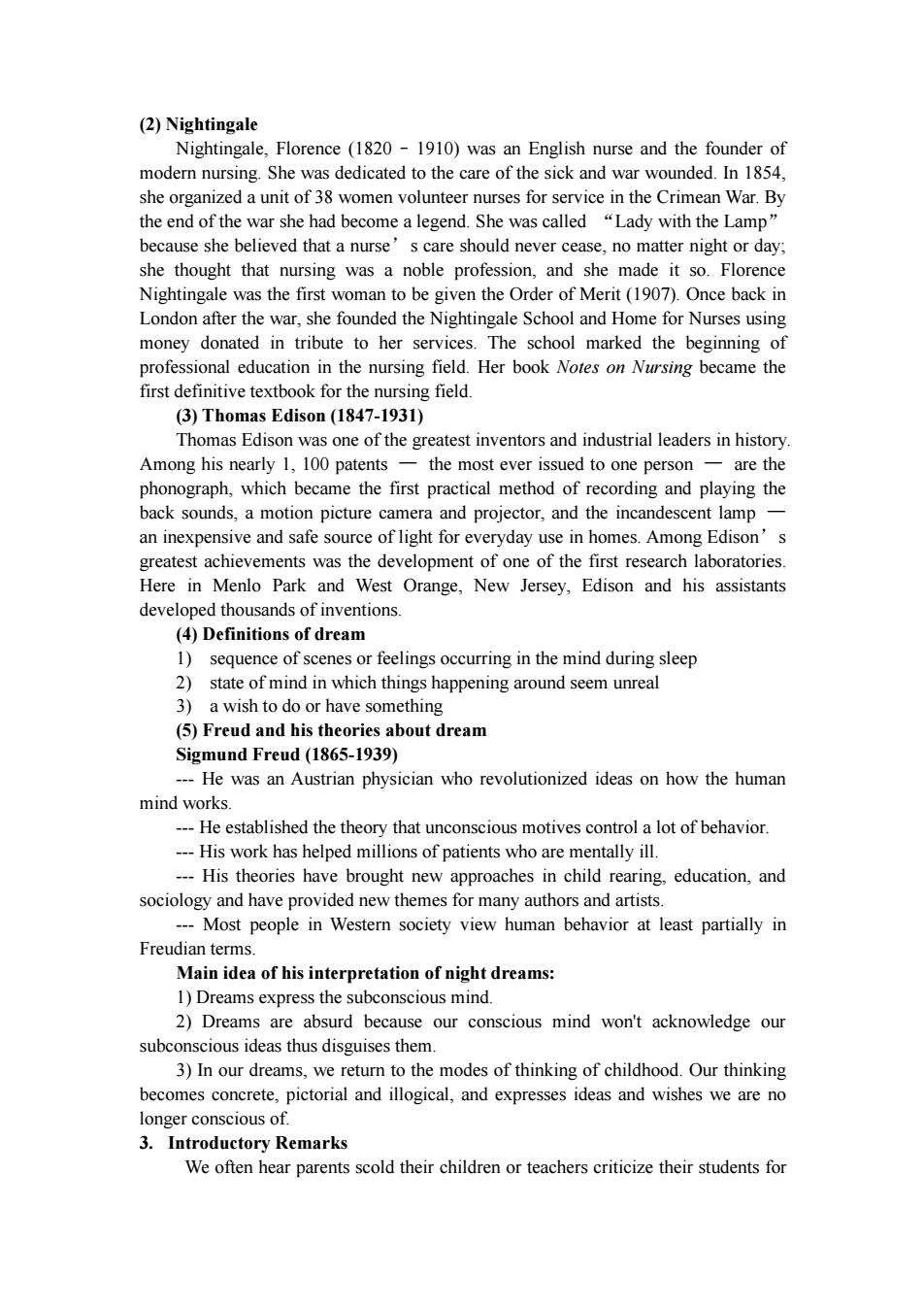
(2)Nightingale Nightingale,Florence (1820-1910)was an English nurse and the founder of modern nu sing She was dedicated tothe of the sickand war wounded. she organized a unit of 38 women volunteer nurses for service in the Crimean War.By the end of the war she had become a legend.She was called "Lady with the Lamp" because she believed that a nurse's care should never cease,no matter night or day: she thought that nursing was a noble profession,and she made it so.Florence Nightingale was the first to be given the Order of Merit(1907).Once back ir London after the war,she founded the Nightingale School and Home for Nurses using money donated in tribute to her services.The school marked the beginning of professional education in the nursing field.Her book Notes on Nursing became the first definitive textbook for the nursing field (3)Thom nas Edison(1847-1931) Thomas Edison was one of the greatest inventors and industrial leaders in history Among his nearly 1,100 patents- the most ever issued to one person are the phonograph,which became the first practical method of recording and playing the back sounds,a motion picture camera and projector,and the incandescent lamp an inexpensive and afe e of light for use in h ng Edis greates hieveme nts was the development of one of the first research laboratorie Here in Menlo Park and West Orange.New Jersey.Edison and his assistants developed thousands of inventions. (4)Definitions of dream 11 of mind in which things happening around seem unrea 3)a wish to do or have something (5)Freud and his theories about dream Sigmund Freud(1865-1939) --He was an austrian physician who revolutionized ideas on how the humar mind works He established the theory that unconscious motives contro a lot of behavior ---His work has helped millions of patients who are mentally ill. --His theories have brought new approaches in child rearing,education,and sociology and have provided new themes for many authors and artists. -Most people in Western society view human behavior at least partially in Freudian terms Main idea of his interpretation of night dreams: 1)Dreams express the subconscious mind. 2)Dreams are absurd because our conscious mind won't acknowledge our subconscious ideas thus disguises them 3)In our dream r to the modes of thinking of childhood.Our thinking becomes concrete,pictorial and illogical,and expresses ideas and wishes we are no longer conscious of. 3.Introductory Remarks We often hear parents scold their children or teachers criticize their students for
(2) Nightingale Nightingale, Florence (1820–1910) was an English nurse and the founder of modern nursing. She was dedicated to the care of the sick and war wounded. In 1854, she organized a unit of 38 women volunteer nurses for service in the Crimean War. By the end of the war she had become a legend. She was called “Lady with the Lamp” because she believed that a nurse’s care should never cease, no matter night or day; she thought that nursing was a noble profession, and she made it so. Florence Nightingale was the first woman to be given the Order of Merit (1907). Once back in London after the war, she founded the Nightingale School and Home for Nurses using money donated in tribute to her services. The school marked the beginning of professional education in the nursing field. Her book Notes on Nursing became the first definitive textbook for the nursing field. (3) Thomas Edison (1847-1931) Thomas Edison was one of the greatest inventors and industrial leaders in history. Among his nearly 1, 100 patents — the most ever issued to one person — are the phonograph, which became the first practical method of recording and playing the back sounds, a motion picture camera and projector, and the incandescent lamp — an inexpensive and safe source of light for everyday use in homes. Among Edison’s greatest achievements was the development of one of the first research laboratories. Here in Menlo Park and West Orange, New Jersey, Edison and his assistants developed thousands of inventions. (4) Definitions of dream 1) sequence of scenes or feelings occurring in the mind during sleep 2) state of mind in which things happening around seem unreal 3) a wish to do or have something (5) Freud and his theories about dream Sigmund Freud (1865-1939) --- He was an Austrian physician who revolutionized ideas on how the human mind works. --- He established the theory that unconscious motives control a lot of behavior. --- His work has helped millions of patients who are mentally ill. --- His theories have brought new approaches in child rearing, education, and sociology and have provided new themes for many authors and artists. --- Most people in Western society view human behavior at least partially in Freudian terms. Main idea of his interpretation of night dreams: 1) Dreams express the subconscious mind. 2) Dreams are absurd because our conscious mind won't acknowledge our subconscious ideas thus disguises them. 3) In our dreams, we return to the modes of thinking of childhood. Our thinking becomes concrete, pictorial and illogical, and expresses ideas and wishes we are no longer conscious of. 3. Introductory Remarks We often hear parents scold their children or teachers criticize their students for
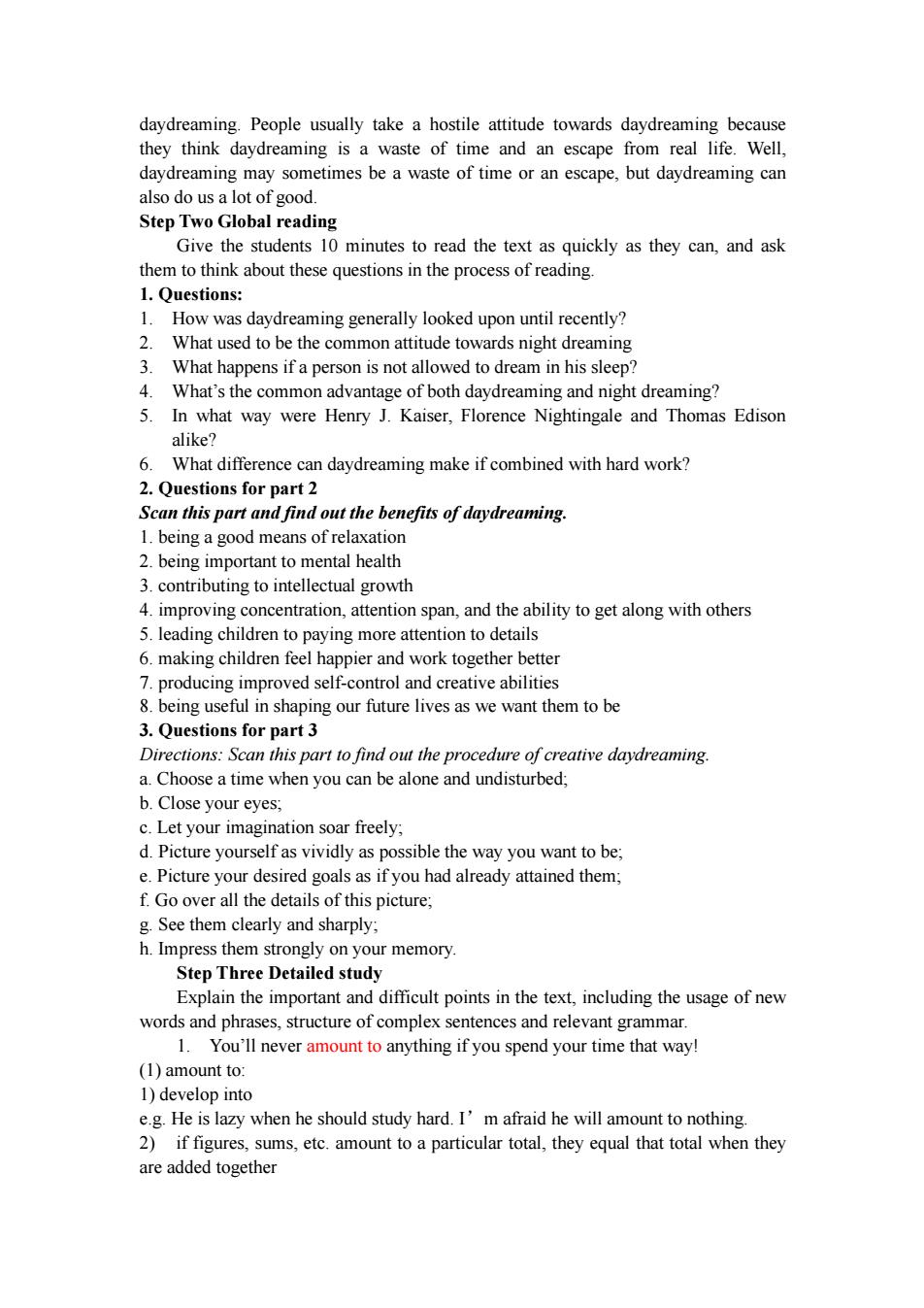
daydreaming.People usually take a hostile attitude towards daydreaming because they think daydreaming is a waste of time and an escape from real life.Well, g may sometimes be a waste of time or an escape,but daydreaming car also do us a l 0fg00 Step Two Global reading Give the students 10 minutes to read the text as quickly as they can,and ask them to think about these questions in the process of reading. 1.Questions: How was daydreaming generally looked upon until recently? What used to be the common attitude towards night dreaming 3.What happens if a person is not allowed to dream in his sleep? 4.What's the common advantage of both daydreaming and night dreaming? 5 In what way were Henry J.Kaiser,Florence Nightingale and Thomas Edisor alike? What difference can daydreaming make if combined with hard work? 2.Questions for part 2 Scan this part and find out the benefits of daydreaming. 1.being a good means of relaxation 2.being mportant to m hea 3.contributing to intellectual growth 4.improving concentration,attention span,and the ability to get along with others 5.leading children to paying more attention to details 6.making children feel happier and work together better 7 ed self- ntrol and aive abilitie 8. in shaping our future lives as we want them to be 3.Questions for part 3 Directions:Scan this part to find out the procedure of creative daydreaming. a.Choose a time when you can be alone and undisturbed; b.Close your eyes; c.Let your imag soar freely: d.Picture yourself as vividly as possible the way you want to be e.Picture your desired goals as if vou had already attained them: f.Go over all the details of this picture; g.See them clearly and sharply: h Impress them s r memory. Step Three Detailed study Explain the important and difficult points in the text,including the usage of new words and phrases,structure of complex sentences and relevant grammar. 1.You'll never amount to anything if you spend your time that way! (1)amount to 1)develop int e.g.He is lazy when he should study hard.I'mafraid he will amount to nothing. 2)if figures,sums,etc.amount to a particular total,they equal that total when they are added together
daydreaming. People usually take a hostile attitude towards daydreaming because they think daydreaming is a waste of time and an escape from real life. Well, daydreaming may sometimes be a waste of time or an escape, but daydreaming can also do us a lot of good. Step Two Global reading Give the students 10 minutes to read the text as quickly as they can, and ask them to think about these questions in the process of reading. 1. Questions: 1. How was daydreaming generally looked upon until recently? 2. What used to be the common attitude towards night dreaming 3. What happens if a person is not allowed to dream in his sleep? 4. What’s the common advantage of both daydreaming and night dreaming? 5. In what way were Henry J. Kaiser, Florence Nightingale and Thomas Edison alike? 6. What difference can daydreaming make if combined with hard work? 2. Questions for part 2 Scan this part and find out the benefits of daydreaming. 1. being a good means of relaxation 2. being important to mental health 3. contributing to intellectual growth 4. improving concentration, attention span, and the ability to get along with others 5. leading children to paying more attention to details 6. making children feel happier and work together better 7. producing improved self-control and creative abilities 8. being useful in shaping our future lives as we want them to be 3. Questions for part 3 Directions: Scan this part to find out the procedure of creative daydreaming. a. Choose a time when you can be alone and undisturbed; b. Close your eyes; c. Let your imagination soar freely; d. Picture yourself as vividly as possible the way you want to be; e. Picture your desired goals as if you had already attained them; f. Go over all the details of this picture; g. See them clearly and sharply; h. Impress them strongly on your memory. Step Three Detailed study Explain the important and difficult points in the text, including the usage of new words and phrases, structure of complex sentences and relevant grammar. 1. You’ll never amount to anything if you spend your time that way! (1) amount to: 1) develop into e.g. He is lazy when he should study hard. I’m afraid he will amount to nothing. 2) if figures, sums, etc. amount to a particular total, they equal that total when they are added together
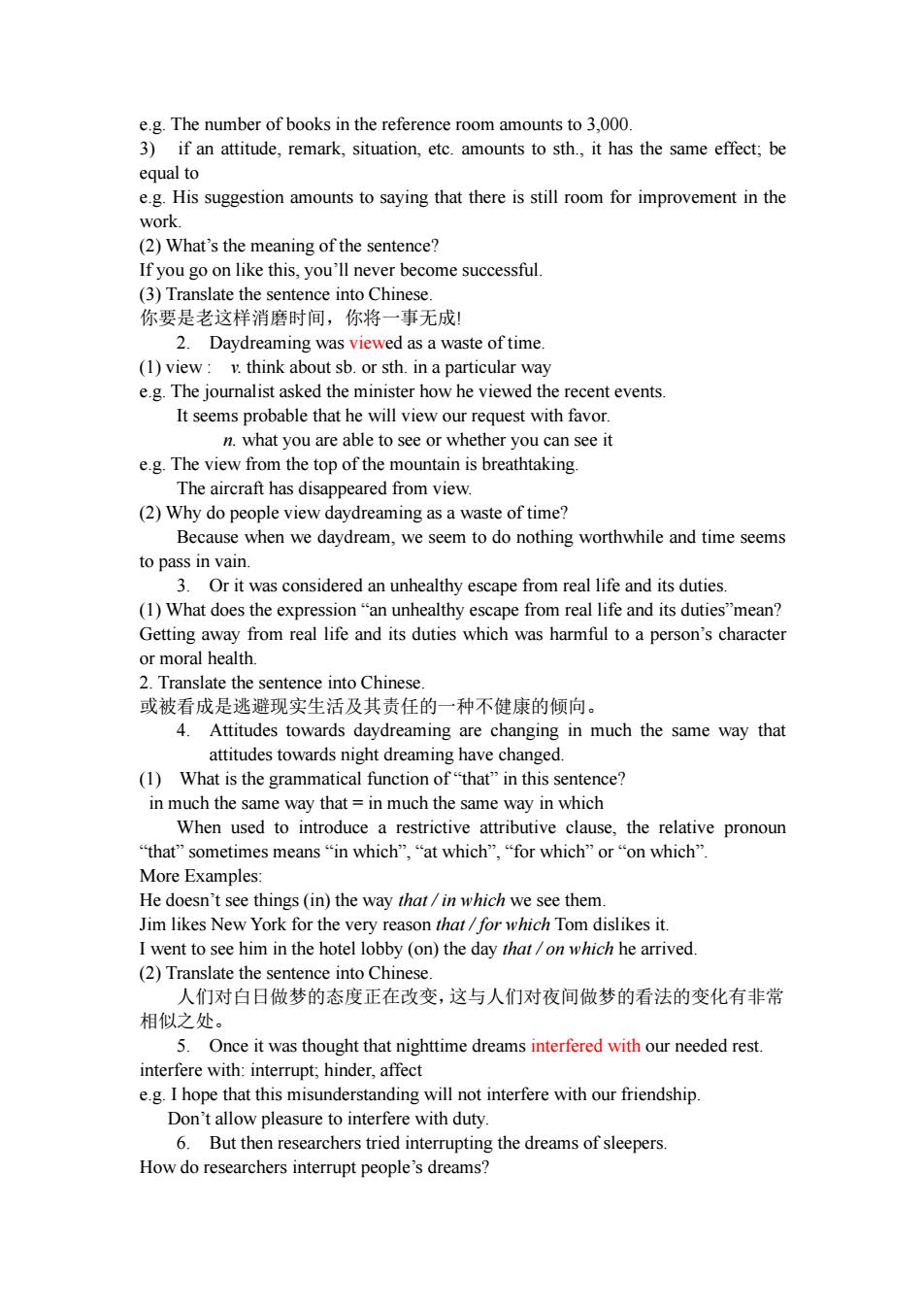
e.g.The number of books in the reference room amounts to 3.000. 3)if an attitude,remark,situation,etc.amounts to sth.,it has the same effect be equal to e.g.His suggestion amounts to saying that there is still room for improvement in the work (2)What's the meaning of the sentence? If you go on like this,you'll never become successful. 3)7 nslate the e se ce into 你要是老这样消磨时间,你将一事无成 2.Davdreaming was viewed as a waste of time (1)view:v.think about sb.or sth.in a particular way e.g.The journalist asked the minister how he viewed the recent events It seems probable that he will view our request with favo n.what you are able to see or whether you can see i e.g.The view from the top of the mountain is breathtaking. The aircraft has disappeared from view. (2)Why do people view daydreaming as a waste of time? en we da ydre m w to do nothing worthwhile and time seems to pass in vain 3.Or it was considered an unhealthy escape from real life and its duties. (1)What does the expression"an unhealthy escape from real life and its duties"mean? Getting away from real life and its duties which was harmful to a person's character or moral health. 2 Tra sla e the ce int 或被看成是逃避现实生活及其责任的一种不健康的倾向。 4.Attitudes towards daydreaming are changing in much the same way that attitudes towards night dreaming have changed. (1)What is the grammatical function of"that"in this sentence? in much thes way that in much the same w ay in which When used to introduce a restrictive attrib clause,the relative pronoun hat”sometimes means“in which'”,“at which”,for which'”or“on which' More Examples: He doesn't see things (in)the way that/in which we see them. Jim likes New York for the ven ason that/for which Tom dislikes it. I went to see him in the hotel obby (on)the day that/onwhich he arrived (2)Translate the sentence into Chinese 人们对白日做梦的态度正在改变,这与人们对夜间做梦的看法的变化有非常 相似之处。 5.Once it was thought that nighttime dreams interfered with our needed rest. interfere with ,affec e.g I hope that this misunderstanding will not interfere with our friendship. Don't allow pleasure to interfere with duty. 6.But then researchers tried interrupting the dreams of sleepers. How do researchers interrupt people's dreams?
e.g. The number of books in the reference room amounts to 3,000. 3) if an attitude, remark, situation, etc. amounts to sth., it has the same effect; be equal to e.g. His suggestion amounts to saying that there is still room for improvement in the work. (2) What’s the meaning of the sentence? If you go on like this, you’ll never become successful. (3) Translate the sentence into Chinese. 你要是老这样消磨时间,你将一事无成! 2. Daydreaming was viewed as a waste of time. (1) view : v. think about sb. or sth. in a particular way e.g. The journalist asked the minister how he viewed the recent events. It seems probable that he will view our request with favor. n. what you are able to see or whether you can see it e.g. The view from the top of the mountain is breathtaking. The aircraft has disappeared from view. (2) Why do people view daydreaming as a waste of time? Because when we daydream, we seem to do nothing worthwhile and time seems to pass in vain. 3. Or it was considered an unhealthy escape from real life and its duties. (1) What does the expression “an unhealthy escape from real life and its duties”mean? Getting away from real life and its duties which was harmful to a person’s character or moral health. 2. Translate the sentence into Chinese. 或被看成是逃避现实生活及其责任的一种不健康的倾向。 4. Attitudes towards daydreaming are changing in much the same way that attitudes towards night dreaming have changed. (1) What is the grammatical function of “that” in this sentence? in much the same way that = in much the same way in which When used to introduce a restrictive attributive clause, the relative pronoun “that” sometimes means “in which”, “at which”, “for which” or “on which”. More Examples: He doesn’t see things (in) the way that / in which we see them. Jim likes New York for the very reason that / for which Tom dislikes it. I went to see him in the hotel lobby (on) the day that / on which he arrived. (2) Translate the sentence into Chinese. 人们对白日做梦的态度正在改变,这与人们对夜间做梦的看法的变化有非常 相似之处。 5. Once it was thought that nighttime dreams interfered with our needed rest. interfere with: interrupt; hinder, affect e.g. I hope that this misunderstanding will not interfere with our friendship. Don’t allow pleasure to interfere with duty. 6. But then researchers tried interrupting the dreams of sleepers. How do researchers interrupt people’s dreams?
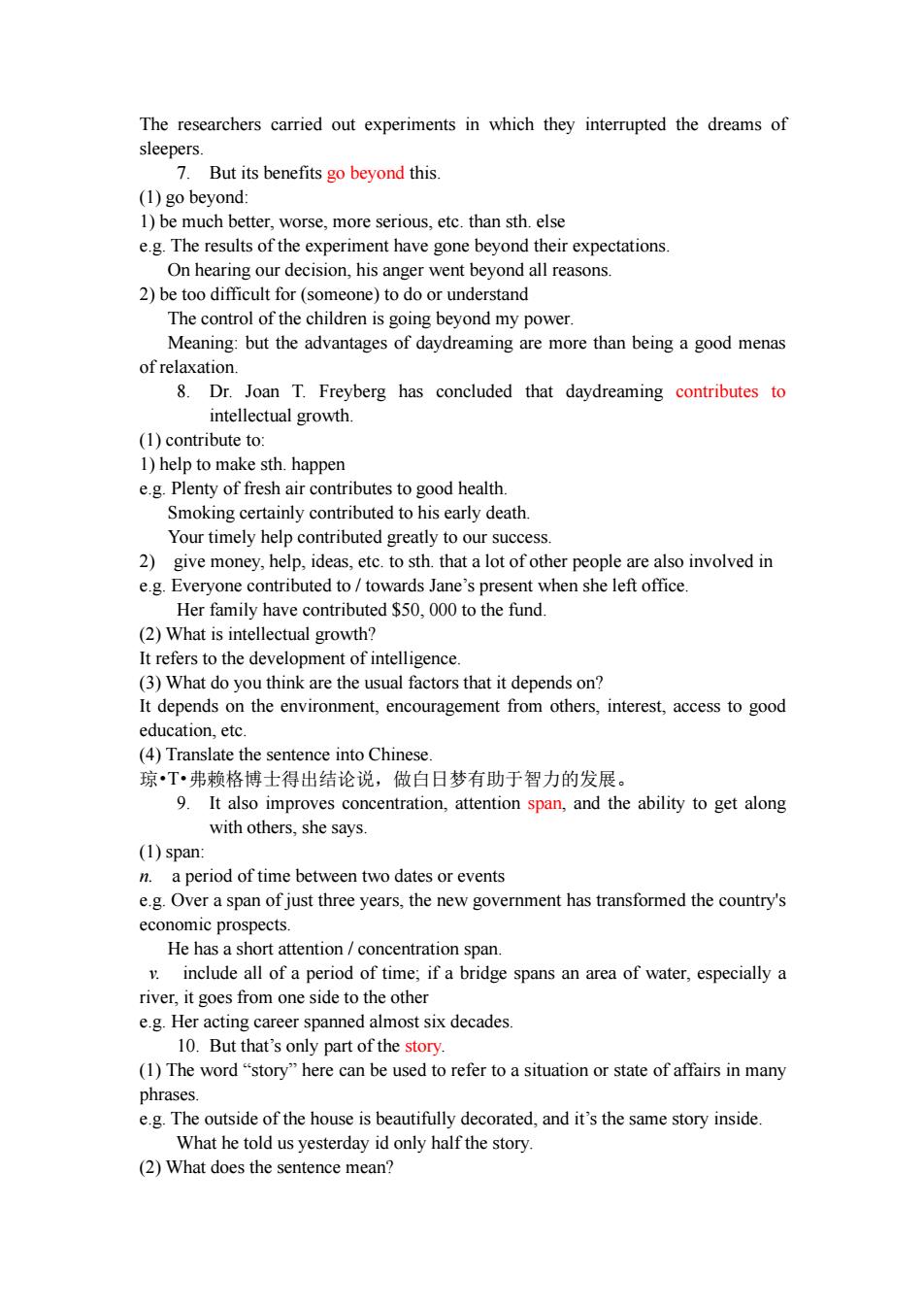
The researchers carried out experiments in which they interrupted the dreams of sleeners 7.But its benefits go beyond this (1)go beyond 1)be much better.worse.more serious.etc.than sth.else e.g.The results of the experiment have gone beyond their expectations. On hearing our decision,his anger r went bevond all reasons. 2)be too difficult for (s one)to do or unde tand The control of the children is going beyond my power. Meaning:but the advantages of daydreaming are more than being a good menas ofrelaxation. 8.Dr.Joan T.Frevberg has concluded that davdreaming contributes to ntellectual growth. (1)contribute 1)help to make sth.happen e.g.Plenty of fresh air contributes to good health. Smoking certainly contributed to his early death. Your timely help contributed greatly to our succes 2 give money,help,ideas,etc.to e.g.Everyone contributed to/toward Jane's present when she left office. Her family have contributed S50.000 to the fund (2)What is intellectual growth? It refers to the development of intelligence (3)What do think are the e usua al factors that it depends on? It depends on the environment,encouragement from others,interest,access to good education,etc (4)Translate the sentence into Chinese 琼T·弗赖格博士得出结论说,做白日梦有助于智力的发展。 with others,she says (1)span: n.a period of time between two dates or events e.g.Over a span of just three years,the new government has transformed the country's economic prospects. He has a sho attention/conce ntration include all of a period of time:if a bridge spans an area of water,especially a river,it goes from one side to the other e.g.Her acting career spanned almost six decades 10.But that's only part of the story. (I)The word“story”her can be used to refer to a situation or state of affairs in many phrases e.g.The outside of the house is beautifully decorated,and it's the same story inside What he told us yesterday id only half the story. (2)What does the sentence mean?
The researchers carried out experiments in which they interrupted the dreams of sleepers. 7. But its benefits go beyond this. (1) go beyond: 1) be much better, worse, more serious, etc. than sth. else e.g. The results of the experiment have gone beyond their expectations. On hearing our decision, his anger went beyond all reasons. 2) be too difficult for (someone) to do or understand The control of the children is going beyond my power. Meaning: but the advantages of daydreaming are more than being a good menas of relaxation. 8. Dr. Joan T. Freyberg has concluded that daydreaming contributes to intellectual growth. (1) contribute to: 1) help to make sth. happen e.g. Plenty of fresh air contributes to good health. Smoking certainly contributed to his early death. Your timely help contributed greatly to our success. 2) give money, help, ideas, etc. to sth. that a lot of other people are also involved in e.g. Everyone contributed to / towards Jane’s present when she left office. Her family have contributed $50, 000 to the fund. (2) What is intellectual growth? It refers to the development of intelligence. (3) What do you think are the usual factors that it depends on? It depends on the environment, encouragement from others, interest, access to good education, etc. (4) Translate the sentence into Chinese. 琼•T•弗赖格博士得出结论说,做白日梦有助于智力的发展。 9. It also improves concentration, attention span, and the ability to get along with others, she says. (1) span: n. a period of time between two dates or events e.g. Over a span of just three years, the new government has transformed the country's economic prospects. He has a short attention / concentration span. v. include all of a period of time; if a bridge spans an area of water, especially a river, it goes from one side to the other e.g. Her acting career spanned almost six decades. 10. But that’s only part of the story. (1) The word “story” here can be used to refer to a situation or state of affairs in many phrases. e.g. The outside of the house is beautifully decorated, and it’s the same story inside. What he told us yesterday id only half the story. (2) What does the sentence mean?
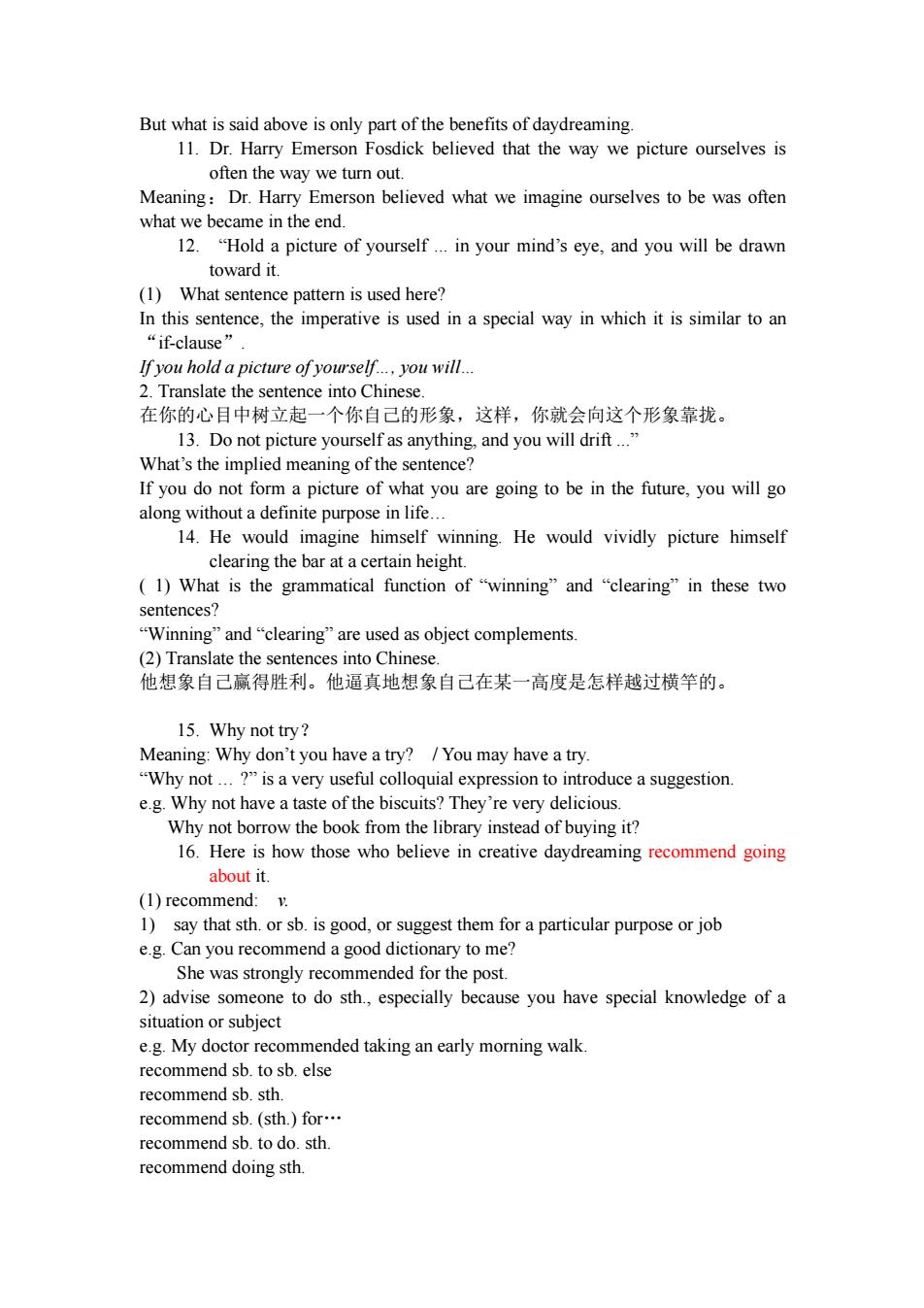
But what is said above is only part of the benefits of daydreaming. 11.Dr.Harry Emerson Fosdick believed that the way we picture ourselves is often the way we turn ou Meaning:Dr.Harry Emerson believed what we imagine ourselves to be was often what we became in the end. 12."Hold a picture of yourself...in your mind's eye,and you will be drawn toward it. (1)What sentence pattern is used here? In this sentence,the imperative is used in a special way in which it is similar to an “if-clause If you hold a picture of yourself....you will.. 2.Translate the sentence into Chinese. 在你的心目中树立起一个你自己的形象,这样,你就会向这个形象靠拢。 13.Do not picture yourself as anything.and you will drif What's the implied meaning of the sentence? If you do not form a picture of what you are going to be in the future,you will go along without a definite purpose in life. 14.He would in e himself winning.He would vividly picture himself clearing the bar at a certain height. (l)What is the grammatical function of“winning”and“clearing”in these two sentences? “Winning”and"clearing”are used as object complements. 15.Why not try? Meaning:Why don't you have a try?/You may have a try "Why not...?"is a very useful colloquial expression to introduce a suggestion Why not have of the biscu ?They'n delicious Why not borrow the book from the library instead of buying it? 16.Here is how those who believe in creative daydreaming recommend going about it. (1)recommend:v. 1)say that sth.or sb.is good,or suggest them for a particular purpose or job eg.Can you recommend a good dicti nary to me? She was strongly recommended for the post 2)advise someone to do sth.,especially because you have special knowledge of a situation or subiect e.g.My doctor recommended taking an early morning walk recommend sb. to sb.else recommend sb.sth recommend sb.(sth.for.. recommend sb.to do.sth. recommend doing sth
But what is said above is only part of the benefits of daydreaming. 11. Dr. Harry Emerson Fosdick believed that the way we picture ourselves is often the way we turn out. Meaning:Dr. Harry Emerson believed what we imagine ourselves to be was often what we became in the end. 12. “Hold a picture of yourself ... in your mind’s eye, and you will be drawn toward it. (1) What sentence pattern is used here? In this sentence, the imperative is used in a special way in which it is similar to an “if-clause”. If you hold a picture of yourself…, you will… 2. Translate the sentence into Chinese. 在你的心目中树立起一个你自己的形象,这样,你就会向这个形象靠拢。 13. Do not picture yourself as anything, and you will drift ...” What’s the implied meaning of the sentence? If you do not form a picture of what you are going to be in the future, you will go along without a definite purpose in life… 14. He would imagine himself winning. He would vividly picture himself clearing the bar at a certain height. ( 1) What is the grammatical function of “winning” and “clearing” in these two sentences? “Winning” and “clearing” are used as object complements. (2) Translate the sentences into Chinese. 他想象自己赢得胜利。他逼真地想象自己在某一高度是怎样越过横竿的。 15. Why not try? Meaning: Why don’t you have a try? / You may have a try. “Why not … ?” is a very useful colloquial expression to introduce a suggestion. e.g. Why not have a taste of the biscuits? They’re very delicious. Why not borrow the book from the library instead of buying it? 16. Here is how those who believe in creative daydreaming recommend going about it. (1) recommend: v. 1) say that sth. or sb. is good, or suggest them for a particular purpose or job e.g. Can you recommend a good dictionary to me? She was strongly recommended for the post. 2) advise someone to do sth., especially because you have special knowledge of a situation or subject e.g. My doctor recommended taking an early morning walk. recommend sb. to sb. else recommend sb. sth. recommend sb. (sth.) for… recommend sb. to do. sth. recommend doing sth

recommend+that-clause (should be/be) (2)go about:start working on do e.g.To leam English well is no matter.We must go about it earestly It's an easy job if you go about it in the right way 17.If it's school success you're after,you can't neglect studying. be after:be in pursuit of,seek,try to obtain;be looking for sb.or sth. e.g.I know what you're after -a comfortable and well-paid job,but I must warn you that it will be a waste of your talent. The police are after him 18.Of course daydreaming is no substitute for hard work (1)substitute:n.a person or thing acting in place of another e.g.Plastic can be a substitute for wood. v.take the place of another,use sth.new or different instead of sth.else e..We must substitute a new chair for the broken on 19.Daydreaming alone can't turn you into your heart's desire. (1)turn..into:cause sb.or sth.to become sb.or sth.different e.g.He is trying to invent a device to turn the solar energy into electricity. (2)What the author's attitude towards daydreaming can be inferred from this sentence? By daydreaming alone without working hard you cannot become what you want to be (3)Translate the sentence into Chinese 单是白日做梦不能使你功成名就,如愿以偿。 20.It could be the difference between becoming merely good at something and e ming a champion Meaning: Th s sentence n eans that without daydreaming you can only become good at something and no more than that,but with daydreaming you may become the best. 21.And who knows: Meaning:Perhaps it could happen. IV.Summary 1.Summary Writing People usually(把做白日梦看作是浪费时间或是对现实 生活的逃避) But now daydreaming has been considered (会在许多方面对人们有神益) Some of the conclusions that researche rs have reached about daydreaming are:It's a good means of relaxation and important to mental health.(它有助于 发展) It improves concentration,attention span,.(并改善与别人相处的能力) It leads children to pay more attention to detail,and makes children feel happier and work together better.It seems to produce improved self-control and creative ability (做白日梦在按我们之间的意愿塑造未来生活中起到有益的作用) As a result,why don't you spare a few minutes each day for daydreaming so as to stir up your vivid imagination? 2.Structure
recommend + that-clause (should be / be) (2) go about: start working on, do e.g. To learn English well is no easy matter. We must go about it earnestly. It’s an easy job if you go about it in the right way 17. If it’s school success you’re after, you can’t neglect studying. be after: be in pursuit of, seek, try to obtain; be looking for sb. or sth. e.g. I know what you’re after — a comfortable and well-paid job, but I must warn you that it will be a waste of your talent. The police are after him. 18. Of course daydreaming is no substitute for hard work. (1) substitute: n. a person or thing acting in place of another e.g. Plastic can be a substitute for wood. v. take the place of another; use sth. new or different instead of sth. else e.g. We must substitute a new chair for the broken one. 19. Daydreaming alone can’t turn you into your heart’s desire. (1) turn…into…: cause sb. or sth. to become sb. or sth. different e.g. He is trying to invent a device to turn the solar energy into electricity. (2)What the author’s attitude towards daydreaming can be inferred from this sentence? By daydreaming alone without working hard you cannot become what you want to be. (3) Translate the sentence into Chinese. 单是白日做梦不能使你功成名就,如愿以偿。 20. It could be the difference between becoming merely good at something and becoming a champion. Meaning: This sentence means that without daydreaming you can only become good at something and no more than that, but with daydreaming you may become the best. 21. And who knows: Meaning:Perhaps it could happen. IV. Summary 1. Summary Writing People usually (把 做 白 日 梦 看 作 是 浪 费 时 间 或 是 对 现 实 生 活 的 逃 避)_________________ But now daydreaming has been considered (会在许多方面对人们有裨益)_______________. Some of the conclusions that researchers have reached about daydreaming are: It’s a good means of relaxation and important to mental health. (它有助于智力发展)________________. It improves concentration, attention span, (并改善与别人相处的能力) ____________________. It leads children to pay more attention to detail, and makes children feel happier and work together better. It seems to produce improved self-control and creative ability. ( 做 白 日 梦 在 按 我 们 之 间 的 意 愿 塑 造 未 来 生 活 中 起 到 有 益 的 作 用 ) ___________________. As a result, why don’t you spare a few minutes each day for daydreaming so as to stir up your vivid imagination? 2. Structure
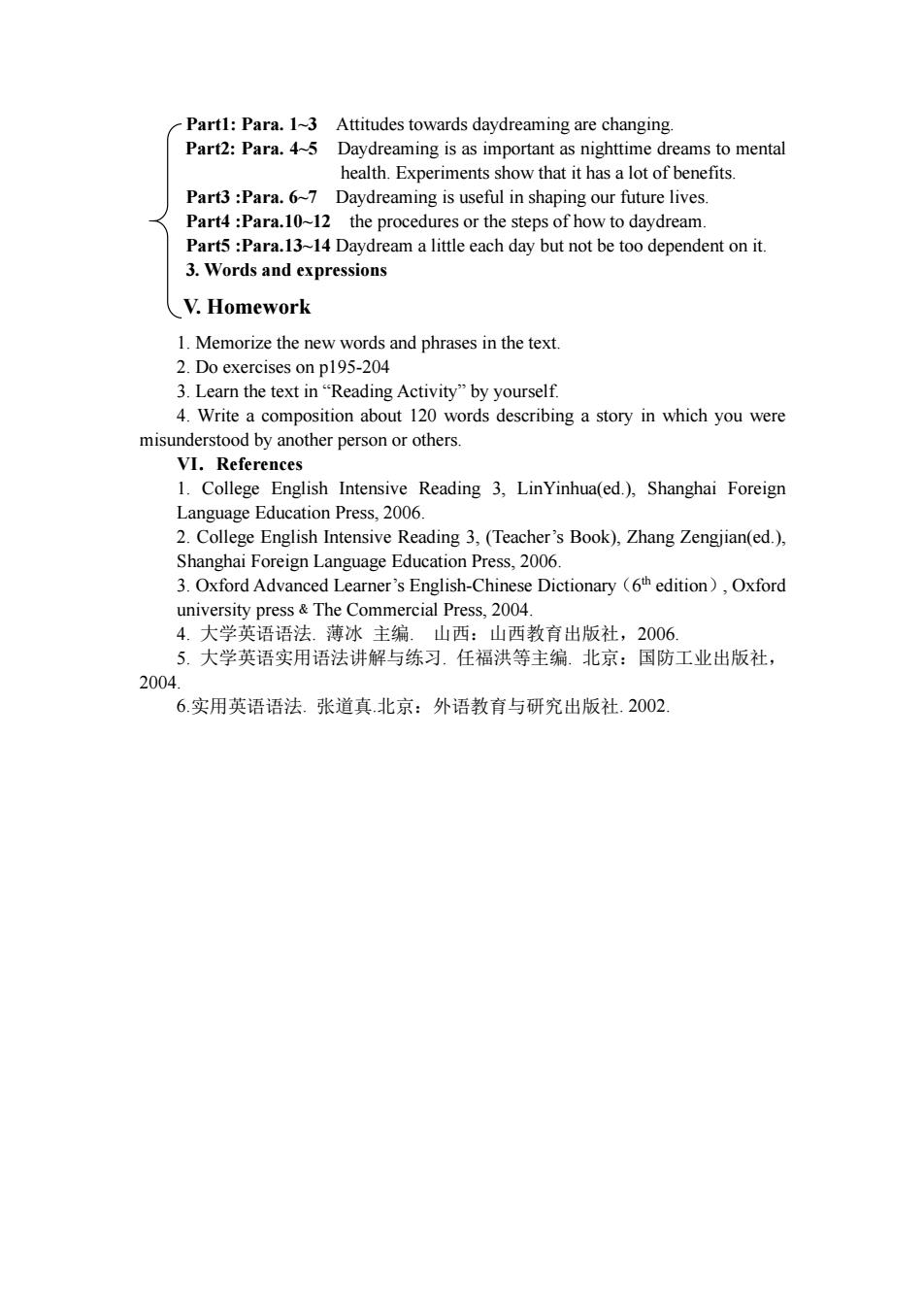
Part:Para.1-3 Attitudes towards daydreaming are changing Part2:Para.4-5 Daydreaming is as eams to mental health.Experiments Part3 :Para.6-7 Daydreaming is useful in shaping our future lives. Part4:Para.10~12 the procedures or the steps of how to daydream. Part5:Para.13-14 Daydream a little each day but not be too dependent on it. 3.Words and expressions V.Homework 1.Memorize the new words and phrases in the text. 2 Do exercises on p195-204 3.Learn the text in"Reading Activity"by yourself. 4.Write misunderstood by another person or others. VI.References 1.College English Intensive Reading 3,LinYinhua(ed.),Shanghai Foreign Language Education Press,2006. ge English Intensive Reading3.(Teacher's Book),ZhangZengjian(ed), Shanghai Foreign Language Education Press,2006 3.Oxford Advanced Learner's English-Chinese Dictionary (6h edition),Oxford university press The Commercial Press,2004. 4.大学英语语法.薄冰主编.。山西:山西教育出版社,2006. 5.大学英语实用语法讲解与练习.任福洪等主编。北京:国防工业出版社, 2004 6.实用英语语法.张道真北京:外语教育与研究出版社.2002
Part1: Para. 1~3 Attitudes towards daydreaming are changing. Part2: Para. 4~5 Daydreaming is as important as nighttime dreams to mental health. Experiments show that it has a lot of benefits. Part3 :Para. 6~7 Daydreaming is useful in shaping our future lives. Part4 :Para.10~12 the procedures or the steps of how to daydream. Part5 :Para.13~14 Daydream a little each day but not be too dependent on it. 3. Words and expressions V. Homework 1. Memorize the new words and phrases in the text. 2. Do exercises on p195-204 3. Learn the text in “Reading Activity” by yourself. 4. Write a composition about 120 words describing a story in which you were misunderstood by another person or others. VI.References 1. College English Intensive Reading 3, LinYinhua(ed.), Shanghai Foreign Language Education Press, 2006. 2. College English Intensive Reading 3, (Teacher’s Book), Zhang Zengjian(ed.), Shanghai Foreign Language Education Press, 2006. 3. Oxford Advanced Learner’s English-Chinese Dictionary(6 th edition), Oxford university press﹠The Commercial Press, 2004. 4. 大学英语语法. 薄冰 主编. 山西:山西教育出版社,2006. 5. 大学英语实用语法讲解与练习. 任福洪等主编. 北京:国防工业出版社, 2004.6.实用英语语法. 张道真.北京:外语教育与研究出版社. 2002